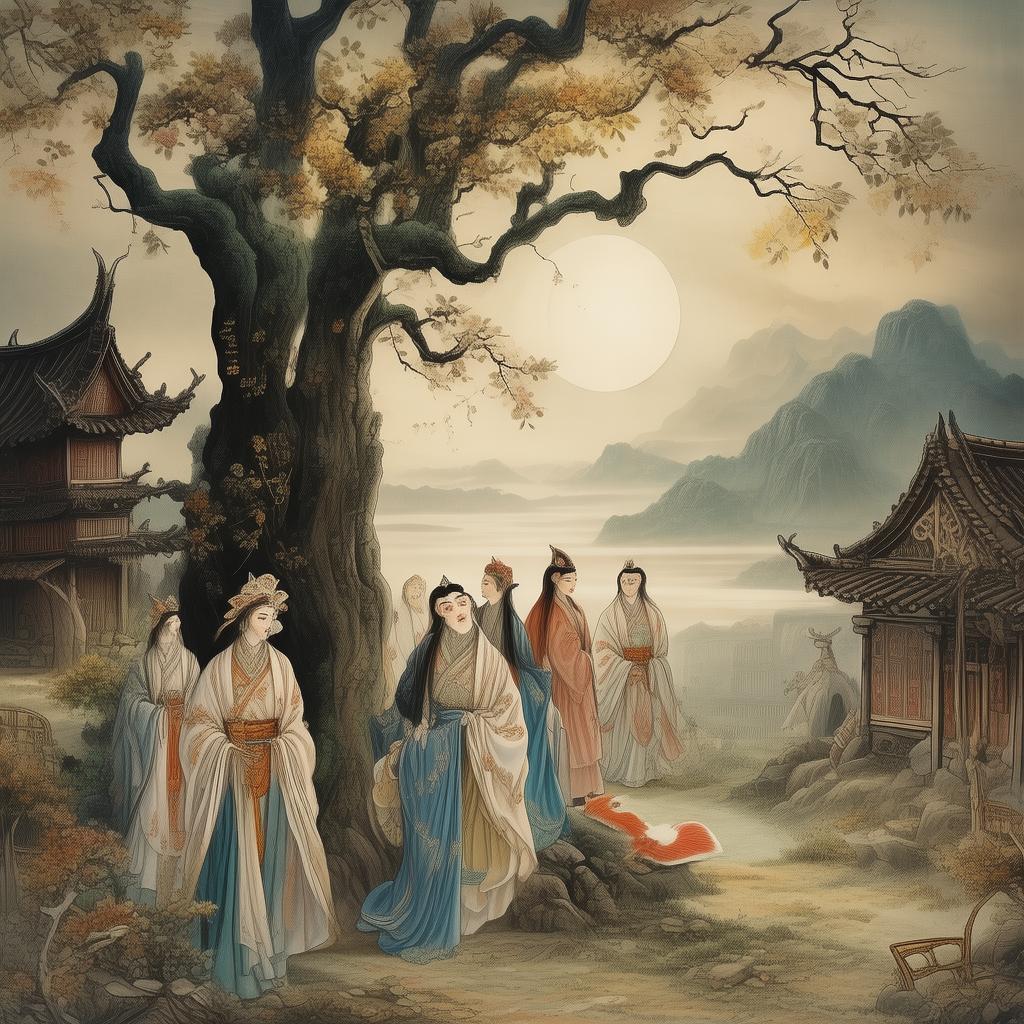Whispers of the Scribe: The Quest for the Lost Scriptures
In the heart of the ancient city of Lishan, where the ink-stained fingers of scribes were as revered as the gods themselves, there lived a man named Jing. Jing was not just any scribe; he was known for his exquisite calligraphy, the delicate strokes that danced across the parchment like the whispers of the spirits. His life was a tapestry woven from the threads of his craft, until one fateful day when a cryptic scroll, written in a language long forgotten, changed everything.
The scroll spoke of the Lost Scriptures, a collection of ancient texts that held the wisdom of a civilization that had vanished into the annals of time. It was said that these scriptures were hidden away in a place where the paths of the living and the dead intertwined—a place known only to the most ancient of legends.
The city was abuzz with rumors of the scriptures, and many had tried to uncover their secrets, but none had succeeded. The scribe, driven by a curiosity that was as old as the mountains, decided to embark on a quest that would take him to the very edge of his endurance.
Jing's journey began in the bustling market of Lishan, where he purchased a worn-out map from an old beggar. The map, a tattered piece of parchment, was adorned with cryptic symbols and a single, faded line that seemed to point towards the west. With a heart full of hope and a mind brimming with questions, Jing set out on his quest.
The first leg of his journey took him through the dense, winding forests that bordered the city. The trees, ancient and twisted, whispered secrets of the past as Jing pushed through the underbrush. He encountered many challenges along the way, from treacherous paths to wild beasts that roamed the night.
One evening, as the sun dipped below the horizon, Jing found himself at a crossroads. The map led him to two paths, one that seemed to be a straight shot to the horizon, and another that twisted and turned, disappearing into the mists of the forest. He paused, his heart pounding with uncertainty, and then made his choice.
He followed the winding path, and soon found himself in a clearing bathed in the soft glow of moonlight. In the center of the clearing stood an ancient stone altar, upon which lay a single, unassuming scroll. Jing approached it cautiously, his fingers trembling with anticipation.
As he reached out to touch the scroll, a voice echoed through the clearing, a voice that seemed to come from everywhere and nowhere. "You seek the wisdom of the ancients, but are you worthy?" the voice demanded.
Jing, his mind racing, knew that he had to answer. "I seek knowledge not for power, but for understanding," he declared. The voice fell silent, and the scroll began to glow with an ethereal light.
The scroll unfurled before him, revealing pages of ancient text. As he read, the words seemed to come alive, each letter a piece of a puzzle that was slowly being solved. He learned of the civilization that had once thrived in this land, of their customs, their beliefs, and their struggles.
But as he delved deeper into the scrolls, he discovered that the wisdom he sought was not merely historical. It was a guide to a deeper understanding of the world, a revelation that would change him forever.

Jing's journey was far from over. The Lost Scriptures had revealed to him that the paths of the living and the dead were not as separate as he had once believed. He realized that his own life was a part of this grand tapestry of existence, and that his calligraphy was more than just an art—it was a way to bridge the gap between the seen and the unseen.
As he continued his quest, Jing encountered more trials and tribulations, each one teaching him more about the nature of the world and his place within it. He met with sages, warriors, and even spirits, all of whom contributed to his understanding of the ancient texts.
In the end, Jing's quest led him back to Lishan, but not as the same man who had set out. He returned with a newfound wisdom, a deeper connection to the world around him, and a sense of purpose that had been missing from his life.
The city of Lishan, once again abuzz with the whispers of the ancients, welcomed him back with open arms. Jing's calligraphy, once known for its beauty, now held a depth of meaning that could only come from the heart of one who had truly walked the path of the scribe.
And so, the legend of Jing, the scribe who sought the Lost Scriptures, was born. His story, filled with mystery, emotion, and the quest for understanding, would be told for generations to come, a testament to the power of the written word and the enduring human spirit.
✨ Original Statement ✨
All articles published on this website (including but not limited to text, images, videos, and other content) are original or authorized for reposting and are protected by relevant laws. Without the explicit written permission of this website, no individual or organization may copy, modify, repost, or use the content for commercial purposes.
If you need to quote or cooperate, please contact this site for authorization. We reserve the right to pursue legal responsibility for any unauthorized use.
Hereby declared.









